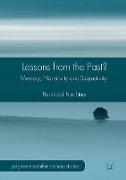- Start
- Lessons from the Past?
Lessons from the Past?
Angebote / Angebote:
‘This book opens up new horizons in the sociological study of memory. It is not only a theoretical adventure, trying to push a critical approach to memory studies, going beyond Habermas, but also an empirical study full of insights into the workings and transformations of the collective memories we live with and the claims to know the lessons from the past which arise from them. It is required reading for everybody looking to make sense of the dynamics of everyday discourse and political discourse in present-day societies about their pasts.’– Klaus Eder, Humboldt-University of Berlin, Germany‘It has almost become cliché to claim to have ‘learnt from history’ in commemorative rhetoric. But what does this mean? Which lessons are to be taken? And how do these lessons vary when referring to Our or Their past wrongdoing? In this erudite and provocative book, Forchtner outlines and analyses four rhetorics of learning – each of which, whilst presenting history as a teacher, are characterised by different narrative grammars. Lessons from the Past? is vital reading for anyone interested in Memory Studies and the politics of commemoration.’– John E. Richardson, Loughborough University, UKThis book reconstructs how claims to know ‘the lessons’ from past wrongdoings are made useful in the present. These claims are powerful tools in contemporary debates over who we are, who we want to be and what we should do. Drawing on a wide range of spoken and written texts from Austria, Denmark, Germany and the United States, this book proposes an abstract framework through which such claims can be understood. It does so by conceptualising four rhetorics of learning and how each of them links memories of past wrongdoings to opposition to present and future wrongdoings. Drawing extensively on narrative theory, Lessons from the Past? reconstructs how links between past, present and future can be narrativised, thus helping to understand the subjectivities and feelings that these stories facilitate. The book closes by considering if and how such rhetorics might live up to their promise to know ‘the lessons’ and to enable learning, offering a revised theory of collective learning processes.
Folgt in ca. 15 Arbeitstagen
